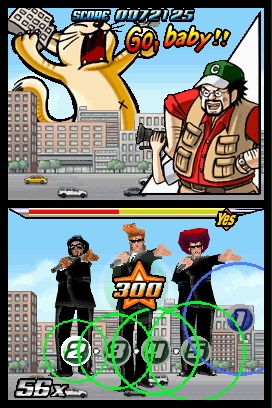Some of the diehard Nintendo DS owners out there might remember a little game called Osu! Tatakae! Ouendan! that was released last year. A ridiculously addictive and completely bizarre rhythm game that had a group of superhero cheerleaders solving the world's problems through dance, it featured some of the tightest and most challenging gameplay you could find on the DS. Trouble is, it never came out in America. But fret not, because a reenvisioning in the form of Elite Beat Agents has now arrived. This isn't the same Japanese game translated into English. Elite Beat Agents is pretty much an all-new game that Americanizes the formula a bit, adding in covers of American pop songs from a wide variety of eras in lieu of the indecipherably Japanese soundtrack of old. Otherwise though, this is an incredibly faithful follow-up to the original game, and the awesome rhythm-based gameplay and spastic presentation are fully intact.

The titular Elite Beat Agents are a group of black-suit-wearing secret agents that apparently work for an old military general and travel around the world solving people's problems. How do they accomplish these feats of heroism, you might ask? These guys get together and do some of the most tightly choreographed dance numbers this side of an '80s-era Michael Jackson video, and through the power of dance, cure the world's ills. Their routines are set to a weird variety of major pop tunes that often fit strangely well to the situation at hand. Think of the whole experience as a cross between Charlie's Angels, Saturday morning anime, and Mama Mia!-esque musical theater. In short, it's completely mind blowing.
A big part of the appeal comes from the presentation and cutscenes that set up each of the game's stages. All these are told through excellent-looking manga-styled sequences that set up each situation with the most extreme imagery possible. People are either incredibly happy or incredibly freaked out at all times. The problems you'll be solving are, of course, not quite what you might expect. You'll be helping babysitters fend off whiny children while they try to ask their jock boyfriends to go steady, 15th-century artists woo would-be models, and auto executives with mild ninjitsu skills take back stolen car designs from a rival company. The scenes are excellently drawn, and it's hard not to laugh at the ridiculousness of what's going on.
All the hyperactive cutscenes are a good setup for the gameplay, which is incredibly fast-paced and challenging. This is a rhythm game through and through. The whole game is controlled via the touch screen. As a stage begins and the music plays, small circles will appear onscreen with numbers on them. These indicate the beats that you must tap in time with the music. A larger circle surrounds each of these numbers, and it quickly caves in. When the outer circle meets up with the numbered circle, that's when you must tap. As complicated as it sounds, the gameplay is really just about finding the groove of the music. If you're not gifted with a good sense of timing, the precision with which you must make your hits might be a little off-putting.
You'll have to do more than just tap, too. Other mechanics include a ball that must be dragged from one end of the screen to another, in time with the music. Sometimes that ball goes back and forth a few times. Often you'll have to alternate taps with drags back and forth in a seriously frantic fashion. There's also a spinning-wheel mechanic that pops up randomly and forces you to spin your stylus around the touch screen so furiously that you might start fearing for your touch screen's safety. The context for all of this is that your taps and movements correspond to the movements of the 3D models of the agents that appear on the touch screen behind all these numbered balls. It can be tough to pay much attention to what the agents are doing while you're playing, but the game smartly includes a replay save option, so you can go back and watch the frenetic dance moves in action, as well as all the crazy manga sequences that play on the top screen, afterward.
If the game sounds challenging, that's because it is--extremely so. Even on the default difficulty, some of the game's stages will likely take a lot of practice to get through. You basically have to learn the individual rhythms of each part of a song, and the game's margin for error isn't very high. As you play, a meter at the top of the touch screen depicts how well you're doing, and a couple of missed hits will drop you into the red quickly. You get varying point scores depending on how exact your taps and movements are to the beat, but a string of imperfect scores also has a tendency to drop your meter down a good bit. However, as tough as the game can be, it's rarely frustrating. A few of the last stages can get vexing after your umpteenth failure, but even still, you'll want to keep going back over and over to finally best them. It's the right balance of difficulty for the most part--at least until you unlock the two harder difficulty levels. The hard mode is noticeably tougher, though once you've beaten the toughest stages on medium, you'll be well prepared for what hard puts in front of you. The hardest level, on the other hand, is just crazy.
Apart from unlocking multiple difficulty modes, you'll also unlock a few bonus stages as you play through the single-player mode. There are 19 stages in all, and it'll likely take you at least a couple of hours with each difficulty level to complete them. Once you're done with single-player, there's a multiplayer mode for both competitive and co-op play for up to four players. Co-op splits songs up amongst two teams of agents, with each taking about half of the beats. In competitive mode, the two teams compete by playing all the same beats and trying to fill their "elite-o-meter" higher than the other team. The game has both multicart and download play, though the download play offers only a limited number of songs. The multiplayer works pretty well, though it also seemed a bit laggy in spots. Download play matches also tend to take an exceedingly long time to load up.

One of the strangest things about Elite Beat Agents is its soundtrack. The grouping of songs that Nintendo has assembled here is equivalent to someone taking the individual music libraries of a teeny-bopper kid and his or her parents, tossing it all into a jar, shaking vigorously, and then scooping out a random handful of songs. '70s classics like the Village People's "YMCA" and Earth, Wind and Fire's "September" are joined by modern pop rock songs like Avril Lavigne's "Sk8er Boi" and Ashlee Simpson's "La La." What's good is that most of these songs line right up with the situations featured in the game. Madonna's "Material Girl" plays while you rescue a pair of ditzy blondes (with rather striking resemblances to Paris Hilton and Nicole Ritchie) from being stranded on a desert island, while the Stray Cats' "Rock This Town" takes place during a casino robbery in Las Vegas. The only real flaw with the soundtrack is that a few of the more recent tracks feel seriously tacked on. "Sk8er Boi" plays while a taxi driver races to get a pregnant woman to a hospital, for example. What? Wouldn't just about any other song in the world have made more sense than that one? It seems like these few out-of-place tracks are there to provide something familiar to those who weren't alive to experience the joys of the Village People or David Bowie back in the day. Still, that makes them stick out like no less of a sore thumb.
Though there isn't much competition, Elite Beat Agents is easily the best rhythm game available for the Nintendo DS, and for that matter, it's easily one of the most randomly addictive experiences on the platform. The idea of just tapping circles in time with music while dudes in suits dance doesn't sound like much on paper, but the insane presentational components and enjoyable challenge the game puts forth do a lot to bring the whole experience together into something extremely playable. Those without a penchant for the unabashedly bizarre might find Elite Beat Agents to be a bit too much, but just about anyone else with a DS would do well to try this one out.